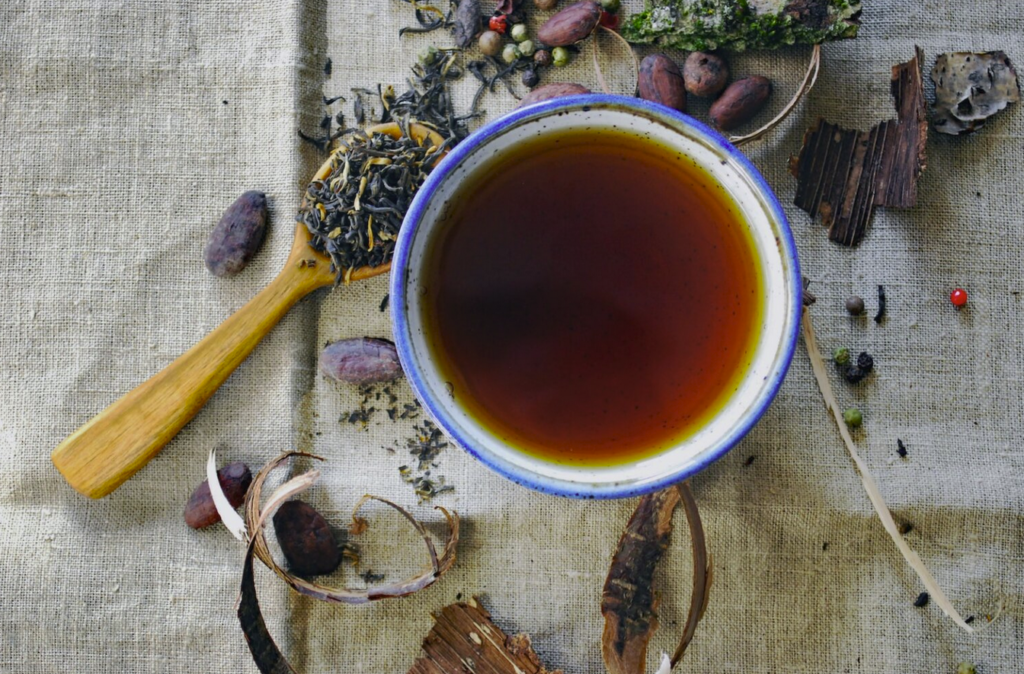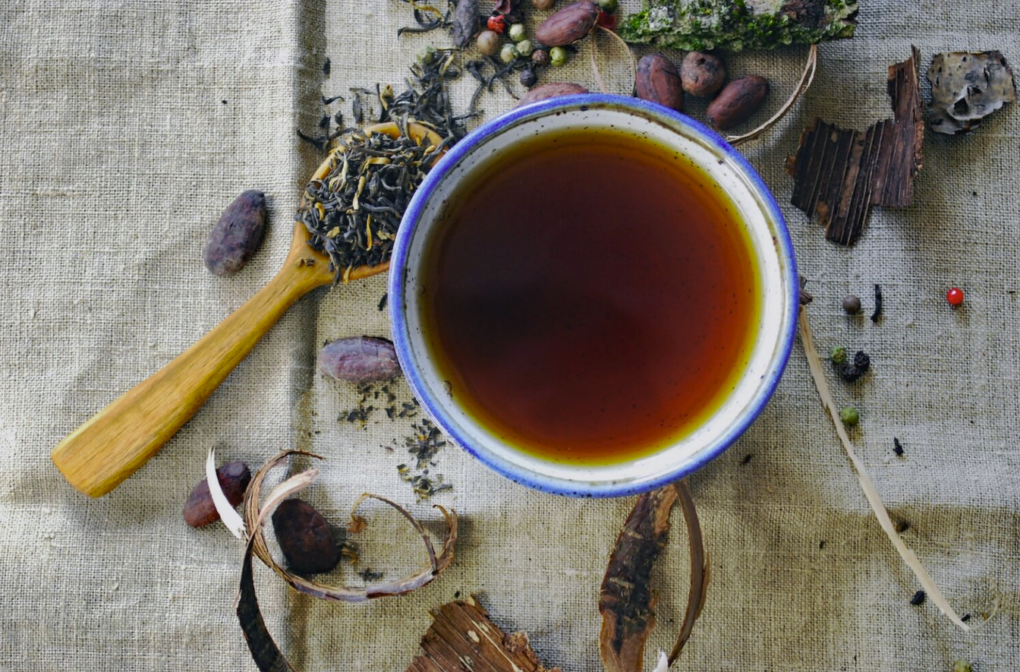Best Tea For Digestion: Top 7 Herbal Remedies Most Recommended By Experts
 By Jilly Hite
By Jilly Hite
Tea has long been celebrated for its numerous health benefits, from boosting the immune system to aiding numerous illnesses. However, one area where tea truly shines is in promoting healthy digestion. Whether you’re dealing with occasional indigestion or chronic digestive issues, certain teas can provide soothing relief and support for your digestive system. We at StudyFinds have found some of the best teas for digestion and how they can help alleviate digestive discomfort!
Tea has so many incredible benefits for your body and health aside from relieving digestive problems. Drinking tea can help to lower your risk of early death, heart attack, and diabetes and can help you live longer overall. So, while you may be targeting stomach issues, you can reap many other positive benefits.
Of course, there are multiple ways to aid in your tummy woes. As we all know, Gastrointestinal (GI) discomfort is never fun, but there are ways to improve digestion without taking drastic measures. Dietitians recommend certain practices like staying hydrated, eating plenty of fiber, eating slower, and limiting stress for positively impacting digestion.
The last and final recommendation, if all else fails, is, of course, tea. That’s why we are here today, after all. As always, we at StudyFinds have researched across multiple expert sources to bring you today’s list of the top seven best teas for digestion to help ease that upset belly. Don’t agree with our ranking or feel we missed out on a good suggestion? No worries. We would love to hear from you in the comments down below. Now, onto the list!
The List: Best Tea for Digestion, According to Experts
1. Peppermint
Peppermint tea is a popular herbal infusion that has been enjoyed for centuries due to its refreshing taste and numerous health benefits. Made from the leaves of the peppermint plant, this aromatic tea is known for its cooling and soothing properties. “Peppermint tea has been known to aid digestion and is used for this purpose around the world in many different cultures. Studies have shown that peppermint tea may alleviate digestive stress and help soothe irritable bowel syndrome symptoms if consumed daily,” says Art Of Tea.
“Peppermint, a green herb from the Mentha piperita plant, is well known for its refreshing flavor and ability to soothe an upset stomach. Animal and human studies have shown that menthol, a compound in peppermint, improves digestive issues,” writes Healthline.
Natural Blaze is Google-Free — We Need Your Support
Contribute Just $1 Per Month at Patreon to Aid the Cause of Health Freedom
“For centuries, peppermint tea has been used to aid digestion and soothe an upset stomach. Peppermint has been specifically studied for relieving gastrointestinal stress, such as IBS. Peppermint contains antispasmodic properties because the menthol in peppermint has a relaxing effect on the intestinal smooth muscle,” adds Tea Leavz.
2. Ginger
Ginger tea, also known as ginger root tea or ginger infusion, is a popular herbal beverage that has been enjoyed for a long time due to its numerous health benefits and refreshing taste. “Used for centuries in herbal and ayurvedic medicine, ginger has powerful anti-inflammatory effects and can help to calm stomach troubles and improve digestive health. Ginger also has a wealth of other health benefits, including soothing sore throats, preventing nausea, and easing morning sickness. Whether you enjoy a spiced black tea as a morning cup or a soothing herbal tea in the evening, ginger is a surefire way to calm the stomach and aid digestion,” states Artful Tea.
“Joyful ginger has just the right amount of spice to shake your senses to life and a whole heap of digestive healing properties, too. Ginger tea is believed to ignite your digestive fire in Ayurvedic healing, and it stimulates your digestive enzymes so your body can break food down swiftly. There have been a bunch of studies into the digestive benefits of ginger, and it’s also a known remedy for keeping nausea and sickness at bay,” notes My Teardrop.
“For many, ginger is an essential part of their kitchen as it adds a unique flavor to food. But it also has a long history of being used for medicinal purposes. As a tea, ginger helps support digestion and relieve nausea. The active ingredient in ginger, gingerol, is believed to have stomach-settling properties that can help ease nausea and promote a healthy appetite. Additionally, ginger tea may help improve digestion by stimulating the production of digestive juices,” comments iHerb.
3. Fennel
Fennel tea, also known as fennel seed tea, is a herbal remedy made from the seeds of the fennel plant. With its unique flavor profile, fennel tea has been enjoyed for centuries in various cultures around the world. “Animal studies have shown that fennel helps prevent stomach ulcers. This ability is likely due to the herb’s antioxidant compounds, which can fight damage associated with ulcer development. It may also help relieve constipation and promote bowel movements, reports Healthline.
“Fennel is a member of the carrot family and has a sweet, anise-like flavor. Fennel tea is made by steeping seeds from the fennel plant in hot water. Both fennel and fennel tea have been used for centuries as a digestive aid and may help reduce gas and bloating. Fennel tea is a good source of antioxidants, helps promote regularity, and may help support the immune system,” explains iHerb.
“Fennel has many uses, including soothing digestive complaints. As an anti-inflammatory and antimicrobial, fennel tea helps restore the balance in your gut and encourage healthy digestion. Fennel is effective against many harmful forms of bacteria, including those that cause digestive issues like diarrhea and indigestion. It also reduces the symptoms of IBS, including abdominal pain,” describes Nutratea.
4. Chamomile
Chamomile tea, derived from the chamomile flower, is a popular herbal tea known for its soothing properties and delicate floral aroma. With a rich history, this tea has been cherished for its calming effects on the body and mind. “The Chamomile flower has been shown to reduce the symptoms of acid reflux, bloating, and gas, which can help promote more normal digestive movements. Additionally, chamomile teas are naturally relaxing, may ease anxiety, and can promote a good night’s sleep. These healthy lifestyle habits can also help soothe your stomach and intestines,” says Art Of Tea.
“Chamomile is lightly soothing and sweet in flavor. It is suitable to reduce acidity, gastrointestinal health, bloating, and gas. Moreover, it is also great for sleep disorders and insomnia. You can use herbal chamomile tea bags, which are easily available on the market,” writes ToneOp.
“Chamomile tea is beloved as a bedtime tea. It offers natural sedative and calming effects that help to improve sleep and relax the senses. Chamomile tea also works to soothe the digestive tract and alleviate symptoms of pain. Chamomile inhibits the production of pepsin—a digestive enzyme linked to acid reflux. The problem arises when too much pepsin is produced and reaches the esophagus. Chamomile helps to tame this digestive enzyme to reduce symptoms,” adds Sencha Tea Bar.
5. Licorice Root
Licorice root is an herb that has been used for centuries in traditional medicine practices. It is native to the Mediterranean and certain parts of Asia, and its distinctive flavor has made it a staple in various culinary traditions around the world. “Licorice root may help to prevent and treat ulcers by increasing the production of mucin, a compound that lines the stomach and protects the stomach from excess stomach acid. The tea also contains flavonoids that may fight off H. pylori bacteria that cause ulcers,” comments Sencha Tea Bar.
“You either love or loathe the anise-like taste of licorice, but whatever your preference, it does make for a magically soothing tea. While licorice root may be better known for helping heal a cough, it also works to prevent ulcers in the stomach,” states My Teardrop.
“People in both Eastern and Western cultures have used licorice to support digestive health for thousands of years. As a demulcent, it may help treat stomach ulcers and heartburn. Licorice may also help reduce the amount of stomach acid produced in the stomach. This can ease heartburn symptoms by reducing the amount of acid that comes back into the esophagus,” notes iHerb.
6. Dandelion Root
Dandelion root tea, derived from the humble dandelion plant, has been consumed for centuries due to its numerous health benefits. This herbal concoction has gained popularity in recent years as more people are discovering its unique flavor and potential medicinal properties. “You may know dandelions best for their cheerful yellow flowers, but their roots are a traditional herbal remedy for many health conditions, including digestive issues. The active components in dandelion root promote healthy digestion by helping food move smoothly through our digestive tracts,” describes Nutratea.
“Animal studies have shown that dandelion extracts contain compounds that may promote digestion by stimulating muscle contractions and promoting the flow of food from the stomach to the small intestine,” explains Healthline.
“Dandelion root has been used for centuries in herbal medicine to improve digestion, fight colds, and improve overall health. Studies have shown that dandelion root can be especially helpful in combating the effects of type two diabetes and other digestive illnesses. Dandelion root imparts a pleasant, earthy tartness to teas and tisanes,” reports Artful Of Tea.
7. Green
Green tea has become an integral part of many cultures, celebrated for its refreshing taste and therapeutic properties. This aromatic tea, made from the leaves of the camellia sinensis plant, has captivated tea enthusiasts and health-conscious individuals alike, leading to a surge in consumption. “Green tea helps to aid digestion due to the presence of antioxidants, catechins, and polyphenols, which helps to lower indigestion symptoms and gastrointestinal and cardiovascular issues. It is easy to digest, soothes the stomach, and relieves bloating and acidity,” raves ToneOp.
“The master healer tea, green tea, is loaded with goodness and considered to be a superfood for good reason. Along with its bounty of other health benefits, green tea is also a dab hand when it comes to ironing out digestive issues,” adds My Teardrop.
“Green tea contains catechins such as EGCG that may help to boost the digestive system. These catechins offer anti-inflammatory properties that help decrease inflammation in the stomach, reducing stomach cramps. Catechins such as EGCG may also help to treat cases of colitis—a disorder caused by inflammation that affects normal digestion,” concludes Sencha Tea Bar.
You might be interested in:
Sources:
Note: This article was not paid for nor sponsored. StudyFinds is not connected to nor partnered with any of the brands mentioned and receives no compensation for its recommendations.
Source: Study Finds
New York raised and Florida-based Jilly Hite studied screenwriting and theatre at The Lee Strasberg Institute before becoming a full time content creator and podcaster. She loves old movies, musical theatre, and her pup Ted.
Image: Tea (Photo by Drew Jemmett on Unsplash)



